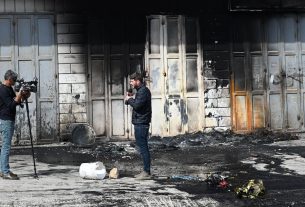The silence from the UAE, Saudi Arabia, and Qatar regarding the Israel-Palestine conflict is indeed a complex and concerning issue, it is also unacceptable to adopt a sit down and watch attitude in this peculiar circumstances. As influential players in the region, their lack of vocal support for resolutions and ceasefires can be seen as an abdication of responsibility, especially given their roles in regional politics and diplomacy.
Many people feel that these nations should take a more active stance in advocating for peace and supporting humanitarian efforts. The geopolitical dynamics, including their relationships with Israel and Western powers, complicate their positions, but it raises questions about their commitment to regional stability and justice.
A proactive role from the UAE, Saudi Arabia, and Qatar could make a significant difference. They have the diplomatic clout and resources to mediate peace talks and facilitate negotiations.
In addition to addressing the situation in Gaza, they could also work on broader regional issues, such as the conflicts in Yemen and Syria, and tensions in Lebanon and Iraq.
By leveraging their relationships with various stakeholders, including Western nations and other Arab states, they could help create a more unified approach to conflict resolution. Strengthening humanitarian aid efforts and promoting dialogue among different factions would also be crucial steps.
Inviting all major groups to the table for dialogue could be a bold and necessary step toward establishing a truce. Creating an inclusive forum where diverse voices are heard could help de-escalate tensions and foster understanding.
Involving international bodies like the UN, ICJ, WHO, and the Red Cross would also add legitimacy to the process and ensure that humanitarian concerns are prioritized. These organizations can provide expertise and resources to address the complex issues at hand.
A comprehensive approach would need to focus on not just immediate ceasefires, but also long-term solutions addressing underlying grievances, socioeconomic factors, and governance issues.
Establishing a framework where all groups have equal representation is crucial for fostering a sense of fairness and encouraging open dialogue. Here are a few ideas on how to structure this process:
- Equal Representation: Ensuring that each group has the same number of representatives can help prevent any single group from dominating the conversation.
- Ground Rules: Setting clear ground rules for respectful dialogue and non-aggressive behavior is essential. This could involve facilitators who can intervene if discussions become heated.
- Mediation: Engaging neutral third-party mediators could help guide conversations and maintain a constructive atmosphere. This could include respected figures from the international community.
- Gradual Approach: Starting with less contentious issues might help build trust among participants before moving on to more sensitive topics.
- Focus on Humanitarian Issues: Prioritizing discussions around humanitarian needs can create a common ground, fostering cooperation and empathy among parties.
- Feedback Mechanisms: Implementing ways for participants to express concerns about the process can help adjust and improve discussions as they progress.
By emphasizing collaboration and understanding, such a framework could pave the way for more comprehensive and lasting resolutions. What are your thoughts on potential challenges to implementing this approach?
Eensuring that all participants have clear authority and communication within their command structures is vital for the success of a ceasefire agreement. Here are some key points to consider:
- Enforcement Mechanisms: Establishing specific protocols for monitoring the ceasefire can help ensure compliance. This might involve joint monitoring teams or observers from international organizations.
- Collective Accountability: If any group violates the ceasefire, it’s crucial that all parties publicly condemn the actions. This collective stance would reinforce the commitment to peace and discourage violations.
- Regular Communication: Facilitating ongoing dialogue between representatives can help address issues as they arise, preventing misunderstandings that could escalate into violence.
- Support from Allies: Engaging influential allies of the participating groups to support the ceasefire can add pressure to adhere to agreements and provide additional security assurances.
- Public Commitment: Having all parties publicly commit to the ceasefire in a joint statement can create a sense of responsibility and commitment to peace among their constituencies.
By fostering a culture of accountability and cooperation, the chances of a ceasefire holding and paving the way for further negotiations improve significantly.
The most important strategy in ensuring such a peace effort achieve the expected aim is to look at adapting and applying a more creative and flexible approach to the process which would entail looking beyond existing considerations and unconventional actions in finding a long lasting peaceful resolution.



